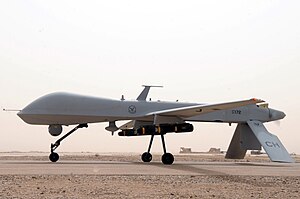TI Aeseptus
This article is incomplete because it is pending further input from participants, or it is a work-in-progress by one author. Please comment on this article's talk page to share your input, comments and questions. Note: To contribute to this article, you may need to seek help from the author(s) of this page. |
| Aeseptus | |
|---|---|

| |
| Air Force Aeseptus | |
| Role | Unmanned Combat Aerial Vehicle |
| Designer | Triad Industries |
| First flight | 8 August 1993 |
| Introduction | 15 July 1996 |
| Status | In service |
| Primary user | See Operators |
| Developed into | TI Sentinel |
The Triad Industries Aeseptus is an unmanned aerial vehicle (UAV) capable of both remote controlled and autonomous operations developed for service with the Belfrasian Air Force and is the first unmanned vehicle in the Triad Industries' drone family, with the aircraft being further developed into the TI Sentinel and then onwards into the TI Guardian. Although both developments are significantly more capable than the Aeseptus, the Belfrasian government continue to operate the Aeseptus in a 'stood-down' role, retiring it from the Air Force in favour of operating it from the coast guard and air guard.
The Aeseptus was originally designed to operate solely as a surveillance platform, and as such initially had no weapon pylons or weapons system on board. Instead it's mission profile was to deploy from it's base, fly a distance or around 740 km (400 nmi, 460 mi), loiter over a target for surveillance for 14 hours, and then return to base. Eventually the vehicle was upgraded to house a laser designation system and weapons package for the utilisation of the Manticore missile, and it's successor the Scorpion missile. The vehicle was outdated in 2006 when the Sentinel was released, which built upon the same style airframe but provided significant improvements in all core aspects of the Aeseptus. Following the Sentinel's entrance to service, the Aeseptus began to operate in a reduced role within the Belfrasian Air Force until it was retired in 2018.
The drone continues to operate in the Belfrasian Home Guard and other domestic government agencies such as the Belfrasian Coast Guard for anti-smuggling and emergency eyes-on surveillance during rescue situations. The Federation's space agency, STAR, utilises the Aeseptus for security and observation purposes, patrolling both it's launch facility Galileo Space Center and for tracking the launch of space vehicles.
Design
Operational history
Variants
- Reconnaissance Series (DR)
- DR.0: Pre-production model for the Aeseptus airframe, five built and now housed in the Aeronautical Museum in Thessalona.
- DR.1: Production model for the Aeseptus and utilised widely by Belfrasian and international buyers.
- DR.1A: Differentiation designation for models of the DR.1 utilising Arthuristan-made electronics for Belisarian buyers.
- Ground attack and Reconnaissance Series (DGRA)
- DGRA.1: Initial attack airframe for the Aeseptus capable of carrying the Manticore and Pilum missiles. Nose-mounted aperture radar removed in favour of weapons suite.
- DGRA.2: Improved attack airframe featuring new antenna system, VHF fin and relocated air intakes for the engines for improved airflow when carrying weapons.
- DGRA.3: Latest attack airframe. Overhauled avionics, countermeasures and control surfaces. Wings increased by 0.91 m (3 ft). Airframe also includes multi-spectral targeting system, wing deicing equipment and secondary daylight and infrared cameras in event of primary camera failure for pilot visual.
Operators
Former Operators
Specifications
General characteristics
- Crew: 0 onboard, 2 in ground station
- Length: 8.23 m (27.0 ft) ()
- Rotor diameter: 14.8 m (49 ft)(DR-Series)
17.84 m (58.5 ft) (DGRA-Series) () - Height: 2.1 m (6.9 ft) ()
- Empty weight: 513 kg (1,131 lb) ()
- Max. takeoff weight: 1,020 kg (2,250 lb) ()
- Powerplant: 1 × Augmenn 115WE turboprop, ()
Performance
- Maximum speed: 135 mph (217 km/h)
- Combat radius: 777 mi (1,250 km) ()
Armament
- Hardpoints: 2

